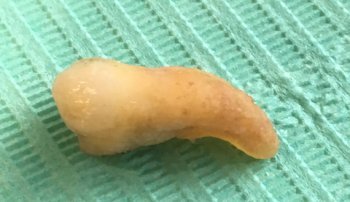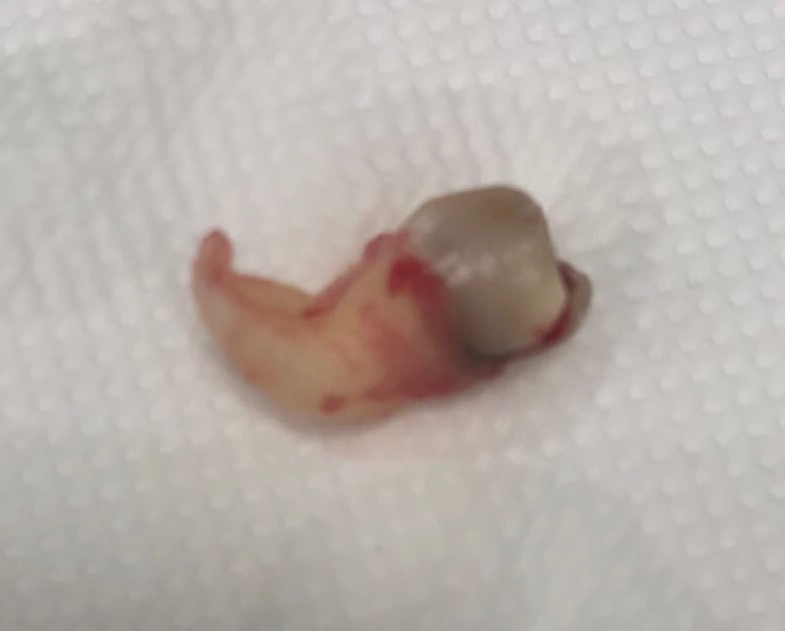Symptoms of Wisdom Teeth
The symptoms of wisdom teeth causing problems are mostly quite obvious, but there are also some symptoms and signs that are not so obvious. Read on to find out more!
When you have some sort of discomfort or pain towards the back of your mouth, the first thing most people think about is "wisdom teeth"!
In 95% of cases, the problem will occur in the LOWER jaw. But what exactly might you notice? What symptoms of wisdom teeth will make you sit up and take notice?
The first thing you might feel is a vague sensation of something being "not right" at the back of your mouth, behind the last teeth on the lower jaw. You may feel that you have eaten something hard and scratched the gum behind the last tooth.
But the gum doesn't settle down. After several days to a week, you still feel that something is tender at the back of your mouth.
THEN you may notice a slight swelling of the gum, right at the back behind the last molars. It will feel a bit puffy on your tongue, and the annoying thing is that it seems to get even MORE irritated by foods than before. What on earth is going on? You have the symptoms of wisdom teeth coming through! (Take a look at Wisdom Tooth Pain as well.)
Symptoms of Wisdom Teeth
What is happening? Your wisdom tooth is starting to grow through the gum. It's the same process as when your baby teeth come through - you are "teething"!
But your baby teeth were quite small. This time around, it's a different ball game - your wisdom teeth are way bigger, and they have to force their way through the gum. Ouch!
THE FIRST THING that happens is that, as the wisdom tooth starts to push up under the gum, it REALLY DOES push the gum up a little bit, and that is why you feel like the gum has been scratched or rubbed by something you have eaten - it probably has, because it is slightly swollen and sticks up more than normal!
This swelling is one of the commonest symptoms of wisdom teeth coming through.
You have a WISDOM TOOTH ACHE.
Once the tooth pokes through the gum a little bit, you may get some relief. The inflammation that was trapped under the gum tissue now has a way out, so the pressure under the gum drops and the discomfort is reduced.
At this point, there may be TWO FACTORS that make things worse. One is a Wisdom Teeth Infection. In short, the simple option is a course of antibiotics. Read more about this at that page.
The SECOND FACTOR that can make things worse is a wisdom tooth in the upper jaw that has also come through, and this tooth is now biting down on the gum overlying the lower wisdom tooth.
Frequently, the gum over the lower wisdom tooth is already a little swollen, partly from the lower tooth pushing the gum up as it tries to come through, and partly from inflammation caused by food rubbing on the puffy gum. But NOW you have the top tooth biting down directly into the puffy gum. OUCH!
This condition where the gum lying over a lower wisdom tooth that is trying to come through the gum is called Pericoronitis.
The quickest solution to this problem is to take out the UPPER wisdom tooth, so that it doesn't bite on the lower gum. This then allows the lower gum to settle down, and we gain some time to plan for the removal of the lower wisdom tooth. Lower wisdom teeth are generally more difficult to remove than upper wisdom teeth.
 an extracted tooth
an extracted toothAn upper wisdom tooth; the root is curved, but NOWHERE NEAR as bent as in the photo of the LOWER wisdom tooth, further down this page!
WHY TAKE OUT THE UPPER WISDOM TOOTH so quickly - why not just go ahead and remove the lower tooth?
In 99% of cases, the upper tooth is already mostly grown through the gum, so it's easier for the dentist to get at. BUT MOST IMPORTANTLY, upper wisdom teeth are generally very easy to remove; the bone around them is relatively thin, almost like eggshell, and there isn't any hard or dense bone behind them to "lock" them in.
It's generally very easy for a dentist to gently lever the tooth backwards and then downwards to remove it. It just rotates out of it's socket.
SO that is a pretty simple and quick procedure to relieve the trauma of the upper wisdom tooth cusp biting on the lower gum. In contrast, the bone around a LOWER wisdom tooth is much more dense, and it is particularly strong right behind the lower wisdom tooth.
There's nowhere soft or easy to push or rotate the tooth. Generally, it has to come straight up, and to make space for it to be removed, we often have to remove some of the bone surrounding the tooth.
This is a more involved procedure than for upper wisdom teeth, leaving bigger hole to heal up. AND THEN THERE'S THE DANGER of nerve damage when removing lower wisdom teeth. There's a big nerve bundle running through the middle of the lower jaw bone, which frequently lies very close to the lower wisdom tooth roots.
So there is a risk that this nerve may become compressed or squashed, or even cut, during the removal of the tooth.
This would leave you with a numb tongue on one side, or a numb lip. If the nerve heals over time, the numbness may fade away over one to six months. But it could be permanent.
Symptoms of Wisdom Teeth
WHAT OTHER SYMPTOMS OF WISDOM TEETH might you get?
So far we have talked about the gum over the LOWER wisdom tooth getting swollen. BUT THIS CAN SPREAD. The next stage is usually to notice that your face is swelling up, over the corner of your lower jawline, just below your ear.
This is caused by infection. The bacteria causing this infection can get into some odd layers of soft tissue around the lower jaw. Take a look at my page on Wisdom Teeth Infection.
The next symptoms of wisdom teeth are difficulty in opening your mouth as wide as normal, and a sensation of the swelling spreading INSIDE the back of your mouth.
You can start to feel a swelling in your throat, which may lead to difficulty in swallowing. In severe cases, it can even start to affect your breathing.
THIS IS SERIOUS - IMMEDIATE TRANSFER TO THE NEAREST E.R. (or hospital emergency department) is needed. The definitive and final answer to the symptoms of wisdom teeth is to remove the tooth!
WAIT - isn't that a major job on LOWER wisdom teeth, with risks of infection and nerve injury? As always in life, the truthful answer is - "It depends"! What does it depend on?
FIRST, when we are talking about WISDOM TEETH REMOVAL, in the lower jaw, we need to consider several factors, making up the DEGREE OF DIFFICULTY;
- How much the wisdom tooth has come through the gum (or not). ie. How much of the tooth is visible?
- The angle of the tooth. Is it tipped or tilted up against the next tooth
- Whether it is actually pressing on the next tooth - this can also cause a cavity in the neighboring tooth, which can be very difficult to restore.
- How close the tooth roots are to the big nerve in the lower jaw. The root tip may sit right on top of the nerve, or even wrap around it.
- The shape and size of the tooth roots. Some are small and straight, others are big and curved, and may even have a "hook" shape! Here is a photograph of a wisdom tooth with a very bent root - very complicated to remove!
 severe root curve on this tooth
severe root curve on this toothOnce you have decided to get the tooth removed, you need to be aware of some possible complications afterwards.
These include possible swelling, and possible Wisdom Teeth Dry Socket.
You can also get an infection in the gum AFTER wisdom tooth removal.
Swelling of the gum and also of the jaw after the removal of a wisdom tooth is fairly normal, depending on the degree of difficulty. (See above). Sometimes it's just a swelling of the gum where the tooth was removed. This will settle down in a week with some hot salt water mouthwashes.
BUT it's important to NOT rinse or mouthwash for 24 hours after the tooth has been removed, otherwise you might wash out the blood clot that is forming in the extraction socket.
Other times, you may get quite a swollen jaw. This is normal, and usually settles in a week to 10 days.
SO, the symptoms of wisdom teeth are quite varied, and treatment can be very simple or very complicated!



